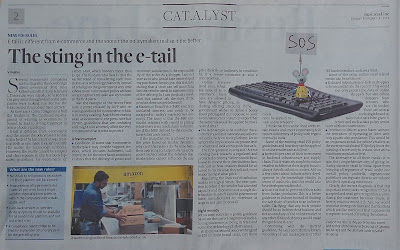With a clear majority and a free “hand”, the new government might want to implement some of the things which had to be compromised in the previous innings. One such was the allowing of FDI in Retail without strings such as single brand or cash & carry, etc. Most people in the Retail sector today expect that FDI in Retail would soon be allowed and this would help big developments and also bring in global expertise.
A couple of points in my mind about this development and the expectations from such an outcome –
Industry status for Retail is required immediately, thereby enabling Retail to avail various benefits from this. This would do much in addressing several issues related to licensing, statutory matters and more importantly access to credit.
Regardless of the industry status, licensing requirements for Retail should be streamlined and unified. Today, depending on the range of products one has in a store as many as 13 – 15 different kinds of licenses are required across a wide range of governmental agencies/ departments. Apart from the time and effort required to get these licenses, which could also vary depending on the state, the effort needed to renew and manage these is time consuming and is a pain.
MRP, do we need it? Had written about this earlier (
http://v-rajesh.blogspot.com/2009/04/mrp-do-we-need-it.html ) and I think the time has come to do away with this or relook at its role. When significant investments are expected in Retail, be it the front end or the back end, the operators should be allowed to leverage pricing based on the other components of the value proposition. To force fit one price for all, disregarding costs of location, service, etc., is not viable in the long run.
Zoning and classification in cities is long overdue and in some cases only on paper. How will this help? The rental costs would be rationalized, especially as we seem to be heading towards a recovery and possible escalation of real estate prices again.
FDI or no FDI, the above four points need immediate attention and some forward thinking solutions if Retail as a sector needs to grow and thrive over a period of time.
Of course, some would include a 5th point of defining/ restricting sizes, formats and locations to protect the small kiranas. However, I don’t think that is feasible and anyways with proper zoning classifications this would be taken care of in a way. Also, if Kirana stores were accorded a status similar to small scale industries, they would fare better. Anyways, as I mentioned in another post of mine (
http://v-rajesh.blogspot.com/2009/04/hidden-advantage.html), their cost structure gives them several inherent advantages and the only disadvantage they have is not being able to aggregate volumes.
Which brings me to an important point with regards to entrants waiting to leverage the opening up of FDI. It would be prudent to understand the Indian customers and focus on the backend more than the front end and this can be done immediately without waiting for FDI rules to change. Worse case scenario, such operators can leverage the supply chain that they invest in for the other Retailers.
Here is where understanding Indian consuming habits is crucial. It is no use focusing only of distribution centres, transportation, etc. This would address only 60% to 70% of the household consumption in terms of FMCG/ packaged products. Also, given the MRP scenario, there is a limit to how much value can be generated by focusing on the supply chain of these categories.
30% to 40% of Indian consumption is basic staples and grocery items as also fresh products. Significant work needs to be done in this sphere to extract value from the supply chain. Being dependent on the same wholesale/ semi-wholesale chain with marginal infrastructure at the tail end will not help. Paradigm changing initiatives like end to end cold chain, cooperative/ corporate farm, etc. needs to be explored and indulged in to extract the value that is present, but is now lost due to damages and intermediaries.
Indian consumers have already experienced and in most cases embraced the self service, modern formats. Therefore, the game changer for a new entrant would not be setting up another air conditioned store with maybe better facilities but in offering a significantly better value proposition. And for that, the key would be the back end.
In summary, FDI might be around the corner. But, to truly leverage that the government should look at making crucial changes and the operators should start working now in putting the infrastructure in place.






